Hans Mierendorff (1882-1955) was a German stage and film actor and film director. He became a star as the gentleman-detective Harry Higgs in silent Krimis and also appeared in such classics as Hilde Warren und der Tod (1917), scripted by Fritz Lang, and the popular serial Die Herrin der Welt (1919). He set up his own production company, Lucifer-Film GmbH, serving for four years as its artistic director. During his career, Hans Mierendorff played in over 100 films.

German postcard by NPG, no. 658. Photo: Alex Binder, Berlin.
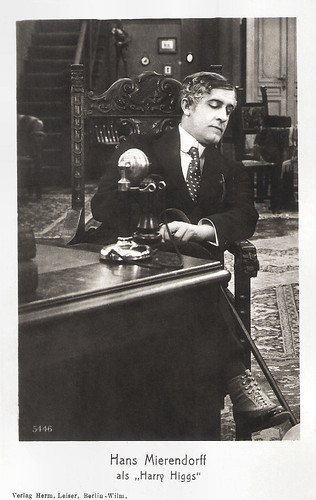
German postcard by Verlag Hermann Leiser, Berlin-Wilm., no. 5446. Hans Mierendorff as Harry Higgs.
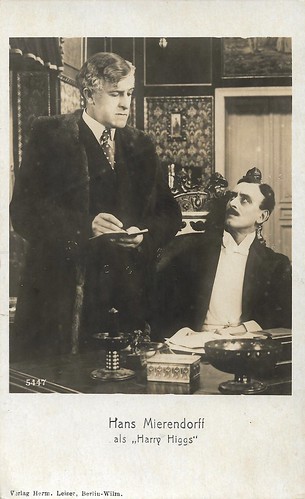
German postcard by Verlag Hermann Leiser, Berlin-Wilm., no. 5447. Hans Mierendorff as Harry Higgs.

German postcard by Photochemie, Berlin, no. K. 247 Photo: Alex Binder.

German postcard by Photochemie, Berlin, no. K. 1836. Photo: A. Binder, Berlin.
Hans Mierendorff was born Johannes Reinhold Mierendorff in Rostock, Germany, in 1882, as the son of the merchant Carl Mierendorff and painter Johanna Reinke. He frequented the Oberschule in Rostock and the grandducal gymnasium in Doberan.
After an initial career as a bookshop seller in Schwerin, he had acting lessons at the Hoftheater in Schwerin and soon switched to a stage career, performing in Hamburg, Halle, and Breslau. Between 1911 and 1919, he worked in Berlin on various stages: at the Residenztheater, the Lessingtheater, the Deutsche Künstlertheater, and the Meinhard-Bernauer-Bühnen.
From 1909 on, Mierendorff was also appearing in the so-called 'Tonbilder' or early sound films by Franz Porten. Thanks to the mediation of Henny Porten’s husband, director/actor Curt Stark, Mierendorff’s real first performance in a silent fiction film was in the Henny Porten-Film Das Adoptivkind / The Adoptive Child (Rudolf Biebrach, 1911).
In the same year, he played next to Asta Nielsen as her father in Der fremde Vogel / The Strange Bird (Urban Gad, 1911). Often, Mierendorff performed as the elegant, distinguished gentleman.
From 1916, his career took a new turn when he started to perform as the gentleman detective Harry Higgs, cashing in on the popular trend of German detective films at the time. The films were scripted by E.A. Dupont, later by Rudolf Meinert. Mierendorff was also successful as Baron Murphy in the eight-part adventure serial Die Herrin der Welt / Mistress of the World (1919), produced and partly directed by Joe May and starring Mia May.
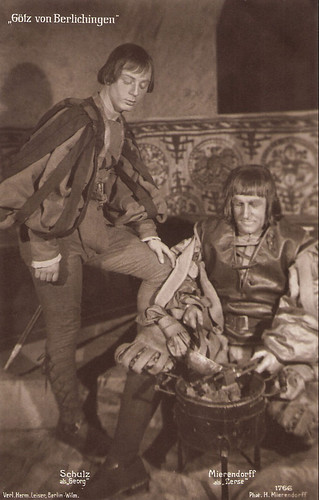
German postcard by Hermann Leiser, Berlin, no. 1766. Photo: Hans Mierendorff. Fritz Schulz as Georg and Hans Mierendorff as Lerse in the stage play 'Götz von Berlichingen', a successful 1773 drama by Johann Wolfgang von Goethe, based on the memoirs of the historical adventurer-poet Gottfried or Götz von Berlichingen.

German postcard. Asta Nielsen and Hans Mierendorff in Jugend und Tollheit / Lady Madcap's Way (Urban Gad, 1913).

German postcard in the Film-Sterne series by Rotophot, no. 503/2. Photo: May Film. Mia May and Hans Mierendorff in Nebel und Sonne (Joe May, 1916). The film narrates the martyrdom of a mother.
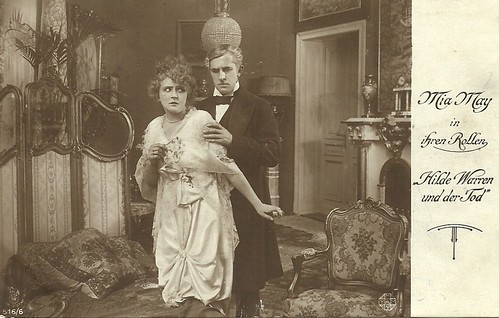
German postcard in the Film-Sterne series by Rotophot, no. 516/6. Photo: May Film. Mia May and Hans Mierendorff in Hilde Warren und der Tod (Joe May, 1917), scripted by Fritz Lang.
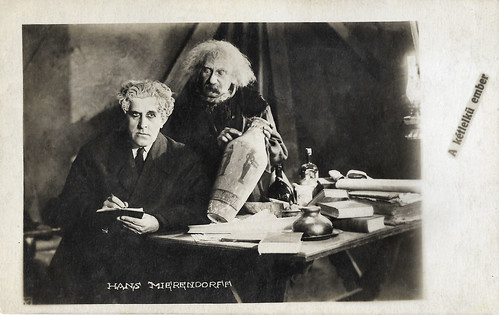
Hungarian postcard, no. 72. Photo: Hans Mierendorff in Ich bin Du / I Am You (Hans Mierendorff, Urban Gad, 1921).

German postcard by Verlag Ross, Berlin, no. 684/6. Photo: Carl-Wilhelm-Film / Terra Film. Olga Tschechova, Hans Mierendorff, and Hans Brausewetter in Soll und Haben / Debit and Credit (Carl Wilhelm, 1924). This German silent film, adapted from the novel by Gustav Freytag, had anti-Semitic and anti-Polish tendencies.

German postcard by Ross Verlag, Berlin, no. 51/1. Photo: Koop Film, Berlin. Hans Mierendorff as the industrialist Franz Großmann and Colette Brettel as his daughter in Die Wacht am Rhein / Aus des Rheinlands Schicksalstagen/Watch on the Rhine (Helene Lackner, 1926).
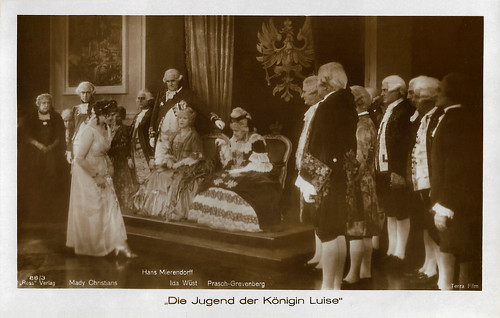
German postcard by Ross Verlag, no. 88/3. Photo: Terra Film. Mady Christians as Louise, Hans Mierendorff, Ida Wüst, and Auguste Prasch-Grevenberg in Königin Luise, 1. Teil - Die Jugend der Königin Luise / Queen Louise (Karl Grune, 1927).
Hans Mierendorff’s detective films were so successful that he could found his own film company, Lucifer-Film GmbH, in 1919. He managed Lucifer-Film until its sellout in 1923. He directed some of the films as well, while others were directed by James Bauer.
In his own productions, mostly adventure and crime films, he often played the leads, as in Teufelskirche / The Devil's Church (Hans Mierendorff, 1919). In this film, Mierendorff plays a priest who is seduced by a farmer’s wife (Agnes Straub), who acts on behalf of the devil (Paul Rehkopf), who wants to found a devil’s church in the place of a German village chapel. In the end, it proves to be just somebody’s nightmare.
Remarkable were Mierendorff’s dual role in Ich bin Du / I Am You (Hans Mierendorff, Urban Gad, 1921), and his role of Fiesco in Die Verschwörung zu Genua / The Genoa Conspiracy (Paul Leni, 1921), co-starring Erna Morena and Fritz Kortner. In the mid-1920s, Mierendorff was often cast as a banker, industrialist, consul, manager, or lawyer. Examples are his parts as Lee Parry’s father in Die Motorbraut / The Motor Bride (Richard Eichberg, 1925), and the industrial in Der Mann der sich verkauft / The Man Who Sells Himself (Hanns Steinhoff, 1925), co-starring Vivian Gibson and Olaf Fjord.
In the sound film era, Mierendorff only performed as a supporting actor in such films as the historical drama Die Tänzerin von Sans Souci / The Dancer of Sanssouci (Friedrich Zelnik, 1932). Set at the court of Frederick the Great, the film is part of a group of Prussian films made during the era. In 1945, Mierndorff completely withdrew from film acting. Subsequently, he ran a pension at the Ostseebad Scharbeutz.
In 1903, he married animal painter Gertrud Schmidt. In 1923, he remarried to singer and actress Auguste Herta Katsch. From this marriage, their son Klaus (1923-1966) stemmed. In 1940, Mierendorff married for the third time to Auguste’s sister, Antonie Katsch. Hans Mierendorff died in 1955 in Eutin, Germany. He was 73. Although he played in more than 100 films during his active career, the name Hans Mierendorff belongs to the forgotten names in film history.
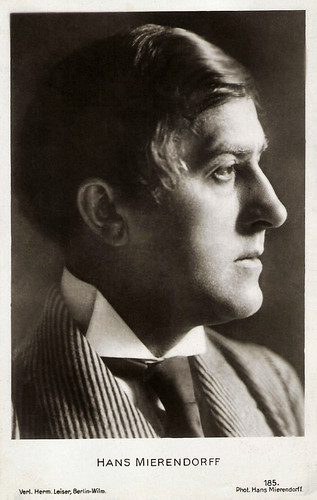
German postcard by Verlag Hermann Leiser, Berlin-Wilm., no. 185. Photo: Hans Mierendorff.
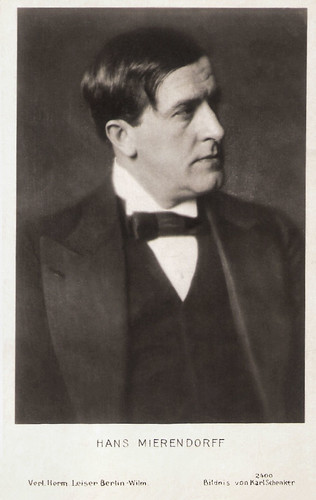
German postcard by Verlag Hermann Leiser, Berlin-Wilm., no. 2400. Photo: Karl Schenker.
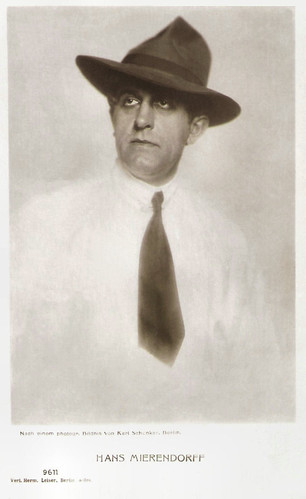
German postcard by Verlag Hermann Leiser, Berlin-Wilm., no. 9611. Photo: Karl Schenker, Berlin.
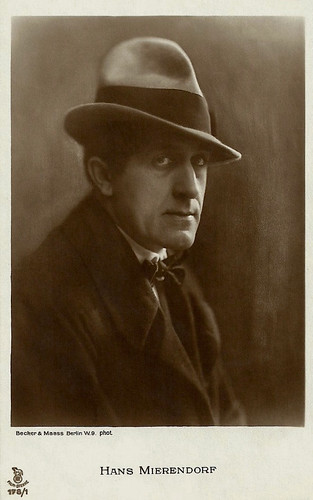
German postcard in the Film Sterne series by Rotophot, no. 178/1. Photo: Becker & Maass, Berlin.
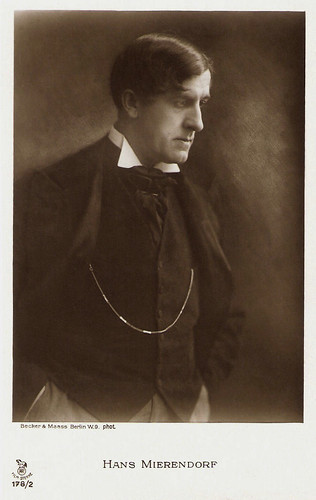
German postcard in the Film Sterne series by Rotophot, no. 178/2. Photo: Becker & Maass, Berlin.

German postcard in the Film Sterne series by Rotophot, no. 178/3. Photo: Becker & Maass, Berlin.
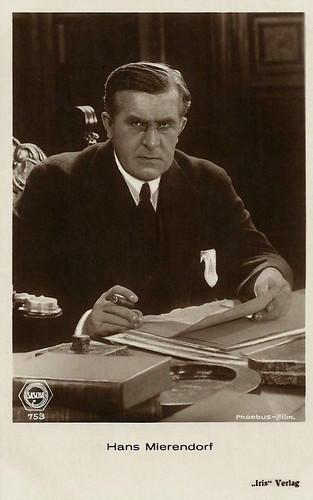
Austrian postcard by Iris-Verlag, no. 753. Photo: Sascha Film / Phoebus-Film.

German postcard by Ross Verlag, no. 3103/1. Photo: Suse Byk, Berlin.
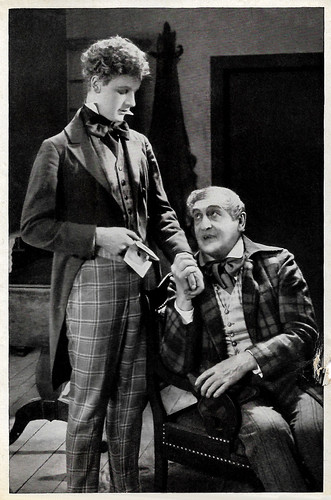
German collectors card in the series 'Vom Werden deutscher Filmkunst - Der Tonfilm', album no. 11, picture no. 130. Photo: Ufa / Ross Verlag. Walter Slezak and Hans Mierendorff in Mein Leopold/My Leopold (Hans Steinhoff, 1931).
Sources: Thomas Staedeli (Cyranos), Film-zeit.de (German - now offline), Filmportal.de (German), Wikipedia (German), and IMDb.
This post was last updated on 4 September 2025.

German postcard by NPG, no. 658. Photo: Alex Binder, Berlin.

German postcard by Verlag Hermann Leiser, Berlin-Wilm., no. 5446. Hans Mierendorff as Harry Higgs.

German postcard by Verlag Hermann Leiser, Berlin-Wilm., no. 5447. Hans Mierendorff as Harry Higgs.

German postcard by Photochemie, Berlin, no. K. 247 Photo: Alex Binder.

German postcard by Photochemie, Berlin, no. K. 1836. Photo: A. Binder, Berlin.
Tonbilder
Hans Mierendorff was born Johannes Reinhold Mierendorff in Rostock, Germany, in 1882, as the son of the merchant Carl Mierendorff and painter Johanna Reinke. He frequented the Oberschule in Rostock and the grandducal gymnasium in Doberan.
After an initial career as a bookshop seller in Schwerin, he had acting lessons at the Hoftheater in Schwerin and soon switched to a stage career, performing in Hamburg, Halle, and Breslau. Between 1911 and 1919, he worked in Berlin on various stages: at the Residenztheater, the Lessingtheater, the Deutsche Künstlertheater, and the Meinhard-Bernauer-Bühnen.
From 1909 on, Mierendorff was also appearing in the so-called 'Tonbilder' or early sound films by Franz Porten. Thanks to the mediation of Henny Porten’s husband, director/actor Curt Stark, Mierendorff’s real first performance in a silent fiction film was in the Henny Porten-Film Das Adoptivkind / The Adoptive Child (Rudolf Biebrach, 1911).
In the same year, he played next to Asta Nielsen as her father in Der fremde Vogel / The Strange Bird (Urban Gad, 1911). Often, Mierendorff performed as the elegant, distinguished gentleman.
From 1916, his career took a new turn when he started to perform as the gentleman detective Harry Higgs, cashing in on the popular trend of German detective films at the time. The films were scripted by E.A. Dupont, later by Rudolf Meinert. Mierendorff was also successful as Baron Murphy in the eight-part adventure serial Die Herrin der Welt / Mistress of the World (1919), produced and partly directed by Joe May and starring Mia May.

German postcard by Hermann Leiser, Berlin, no. 1766. Photo: Hans Mierendorff. Fritz Schulz as Georg and Hans Mierendorff as Lerse in the stage play 'Götz von Berlichingen', a successful 1773 drama by Johann Wolfgang von Goethe, based on the memoirs of the historical adventurer-poet Gottfried or Götz von Berlichingen.

German postcard. Asta Nielsen and Hans Mierendorff in Jugend und Tollheit / Lady Madcap's Way (Urban Gad, 1913).

German postcard in the Film-Sterne series by Rotophot, no. 503/2. Photo: May Film. Mia May and Hans Mierendorff in Nebel und Sonne (Joe May, 1916). The film narrates the martyrdom of a mother.

German postcard in the Film-Sterne series by Rotophot, no. 516/6. Photo: May Film. Mia May and Hans Mierendorff in Hilde Warren und der Tod (Joe May, 1917), scripted by Fritz Lang.

Hungarian postcard, no. 72. Photo: Hans Mierendorff in Ich bin Du / I Am You (Hans Mierendorff, Urban Gad, 1921).

German postcard by Verlag Ross, Berlin, no. 684/6. Photo: Carl-Wilhelm-Film / Terra Film. Olga Tschechova, Hans Mierendorff, and Hans Brausewetter in Soll und Haben / Debit and Credit (Carl Wilhelm, 1924). This German silent film, adapted from the novel by Gustav Freytag, had anti-Semitic and anti-Polish tendencies.

German postcard by Ross Verlag, Berlin, no. 51/1. Photo: Koop Film, Berlin. Hans Mierendorff as the industrialist Franz Großmann and Colette Brettel as his daughter in Die Wacht am Rhein / Aus des Rheinlands Schicksalstagen/Watch on the Rhine (Helene Lackner, 1926).

German postcard by Ross Verlag, no. 88/3. Photo: Terra Film. Mady Christians as Louise, Hans Mierendorff, Ida Wüst, and Auguste Prasch-Grevenberg in Königin Luise, 1. Teil - Die Jugend der Königin Luise / Queen Louise (Karl Grune, 1927).
Lucifer
Hans Mierendorff’s detective films were so successful that he could found his own film company, Lucifer-Film GmbH, in 1919. He managed Lucifer-Film until its sellout in 1923. He directed some of the films as well, while others were directed by James Bauer.
In his own productions, mostly adventure and crime films, he often played the leads, as in Teufelskirche / The Devil's Church (Hans Mierendorff, 1919). In this film, Mierendorff plays a priest who is seduced by a farmer’s wife (Agnes Straub), who acts on behalf of the devil (Paul Rehkopf), who wants to found a devil’s church in the place of a German village chapel. In the end, it proves to be just somebody’s nightmare.
Remarkable were Mierendorff’s dual role in Ich bin Du / I Am You (Hans Mierendorff, Urban Gad, 1921), and his role of Fiesco in Die Verschwörung zu Genua / The Genoa Conspiracy (Paul Leni, 1921), co-starring Erna Morena and Fritz Kortner. In the mid-1920s, Mierendorff was often cast as a banker, industrialist, consul, manager, or lawyer. Examples are his parts as Lee Parry’s father in Die Motorbraut / The Motor Bride (Richard Eichberg, 1925), and the industrial in Der Mann der sich verkauft / The Man Who Sells Himself (Hanns Steinhoff, 1925), co-starring Vivian Gibson and Olaf Fjord.
In the sound film era, Mierendorff only performed as a supporting actor in such films as the historical drama Die Tänzerin von Sans Souci / The Dancer of Sanssouci (Friedrich Zelnik, 1932). Set at the court of Frederick the Great, the film is part of a group of Prussian films made during the era. In 1945, Mierndorff completely withdrew from film acting. Subsequently, he ran a pension at the Ostseebad Scharbeutz.
In 1903, he married animal painter Gertrud Schmidt. In 1923, he remarried to singer and actress Auguste Herta Katsch. From this marriage, their son Klaus (1923-1966) stemmed. In 1940, Mierendorff married for the third time to Auguste’s sister, Antonie Katsch. Hans Mierendorff died in 1955 in Eutin, Germany. He was 73. Although he played in more than 100 films during his active career, the name Hans Mierendorff belongs to the forgotten names in film history.

German postcard by Verlag Hermann Leiser, Berlin-Wilm., no. 185. Photo: Hans Mierendorff.

German postcard by Verlag Hermann Leiser, Berlin-Wilm., no. 2400. Photo: Karl Schenker.

German postcard by Verlag Hermann Leiser, Berlin-Wilm., no. 9611. Photo: Karl Schenker, Berlin.

German postcard in the Film Sterne series by Rotophot, no. 178/1. Photo: Becker & Maass, Berlin.

German postcard in the Film Sterne series by Rotophot, no. 178/2. Photo: Becker & Maass, Berlin.

German postcard in the Film Sterne series by Rotophot, no. 178/3. Photo: Becker & Maass, Berlin.

Austrian postcard by Iris-Verlag, no. 753. Photo: Sascha Film / Phoebus-Film.

German postcard by Ross Verlag, no. 3103/1. Photo: Suse Byk, Berlin.

German collectors card in the series 'Vom Werden deutscher Filmkunst - Der Tonfilm', album no. 11, picture no. 130. Photo: Ufa / Ross Verlag. Walter Slezak and Hans Mierendorff in Mein Leopold/My Leopold (Hans Steinhoff, 1931).
Sources: Thomas Staedeli (Cyranos), Film-zeit.de (German - now offline), Filmportal.de (German), Wikipedia (German), and IMDb.
This post was last updated on 4 September 2025.
No comments:
Post a Comment